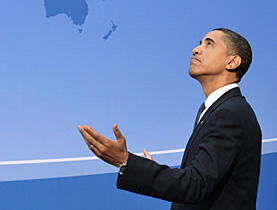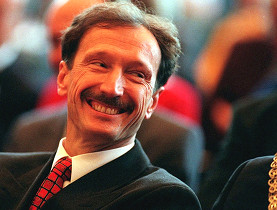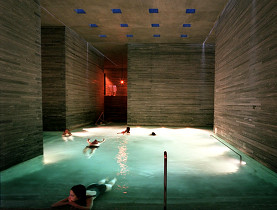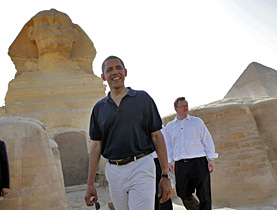Obama wins Nobel Peace Prize

President Barack Obama has won the 2009 Nobel Peace Prize for "his extraordinary efforts to strengthen international diplomacy and cooperation between peoples".
The Norwegian Nobel Committee cited on Friday his outreach to the Muslim world and attempts to curb nuclear proliferation.
The choice made Obama the third sitting president of the United States to win the Nobel Peace Prize and surprised Nobel observers because Obama took office less than two weeks before the February 1 nomination deadline.
Obama’s name had been mentioned in speculation before the award but many Nobel watchers believed it was too early to give it to the president.
Rather than recognising concrete achievements, the 2009 prize appeared intended to support initiatives that have yet to bear fruit: reducing the world stock of nuclear arms, easing American conflicts with Muslim nations and strengthening the US role in combating climate change.
“Only very rarely has a person to the same extent as Obama captured the world’s attention and given its people hope for a better future,” the committee said.
“His diplomacy is founded in the concept that those who are to lead the world must do so on the basis of values and attitudes that are shared by the majority of the world’s population.”
The plaudit appeared to be a slap at President George W. Bush from a committee that harshly criticised Obama’s predecessor for resorting to largely unilateral military action in the wake of the September 11 attacks.
“Obama has as president created a new climate in international politics. Multilateral diplomacy has regained a central position, with emphasis on the role that the United Nations and other international institutions can play,” the committee said.
Reaction
The chief Palestinian peace negotiator, Saeb Erekat, welcomed the award to Obama.
“We hope that he will be able to achieve peace in the Middle East and achieve Israeli withdrawal to 1967 borders and establish an independent Palestinian state on 1967 borders, with Jerusalem as its capital,” he told Reuters.
In Gaza however an Islamic Jihad leader, Khaled Al-Batsh, condemned the Nobel committee decision.
“Obama’s winning the peace prize shows these prizes are political, not governed by the principles of credibility, values and morals,” he told Reuters.
“Why should Obama be given a peace prize while his country owns the largest nuclear arsenal on Earth and his soldiers continue to shed innocent blood in Iraq and Afghanistan?”
Last month Obama chaired an historic meeting of the UN Security Council, which unanimously approved a US-drafted resolution calling on nuclear weapons states to scrap their arsenals.
Swiss success
Three Swiss individuals have won the Nobel Peace Prize: Henry Dunant, founder of the International Committee of the Red Cross (ICRC), in 1901; and Elie Ducommun and Charles Albert Gobat, honorary secretaries of the Permanent International Peace Bureau, in 1902.
Since then many Swiss-based international organisations have been honoured, including the ICRC (a record three times), the Nansen International Office for Refugees, the UN High Commissioner for Refugees, Médecins Sans Frontières and the Intergovernmental Panel on Climate Change.
Obama is the fourth US president to win the award: Theodore Roosevelt and Woodrow Wilson won in office in 1906 and 1919 respectively; former President Jimmy Carter won in 2002. Former Vice-president Al Gore shared the 2007 prize with the UN panel on climate change.
The Nobel committee received a record 205 nominations for this year’s prize.
“Spreading of peace”
In his 1895 will, Alfred Nobel stipulated that the peace prize should go “to the person who shall have done the most or the best work for fraternity between the nations and the abolition or reduction of standing armies and the formation and spreading of peace congresses”.
Unlike the other Nobel Prizes, which are awarded by Swedish institutions, he said the peace prize should be given out by a five-member committee elected by the Norwegian Parliament. Sweden and Norway were united under the same crown at the time of Nobel’s death.
The committee has taken a wide interpretation of Nobel’s guidelines, expanding the prize beyond peace mediation to include efforts to combat poverty, disease and climate change.
The prize, worth 10 million Swedish krona (SFr1.47 million), will be handed over in Oslo on December 10.
swissinfo.ch and agencies
Mother Teresa refused to attend a Nobel dinner in Oslo when she went to collect her prize in 1979, saying the money would be better spent on the poor. The banquet was cancelled.
Protesters threw snowballs at the US ambassador in Oslo when he arrived to collect the 1973 prize on behalf of Secretary of State Henry Kissinger for brokering an unsuccessful deal to end the Vietnam war. North Vietnamese negotiator Le Duc Tho turned down the joint award, the most controversial in the prize’s history.
Past nominees have included Adolf Hitler and Josef Stalin.
Hitler banned Germans from accepting Nobel prizes in disgust after the 1935 award went to pacifist anti-Nazi writer Carl von Ossietzky. The ruling affected three German scientists awarded prizes for chemistry and medicine in the late 1930s.
2009 – US President Barack Obama for efforts to strengthen international diplomacy and cooperation between peoples.
2008 – Former Finnish President Martti Ahtisaari for peace work from Namibia to Kosovo.
2007 – Former US Vice-president Al Gore and the Intergovernmental Panel on Climate Change.
2006 – Muhammad Yunus and Bangladesh’s Grameen Bank for work to end poverty.
2005 – The International Atomic Energy Agency and its head Mohamed ElBaradei.
2004 – Kenyan environmentalist Wangari Maathai.
2003 – Iranian human rights lawyer Shirin Ebadi.
2002 – Former US President Jimmy Carter.
2001 – The United Nations and Secretary-general Kofi Annan.
2000 – South Korean President Kim Dae-jung.

In compliance with the JTI standards
More: SWI swissinfo.ch certified by the Journalism Trust Initiative














You can find an overview of ongoing debates with our journalists here . Please join us!
If you want to start a conversation about a topic raised in this article or want to report factual errors, email us at english@swissinfo.ch.